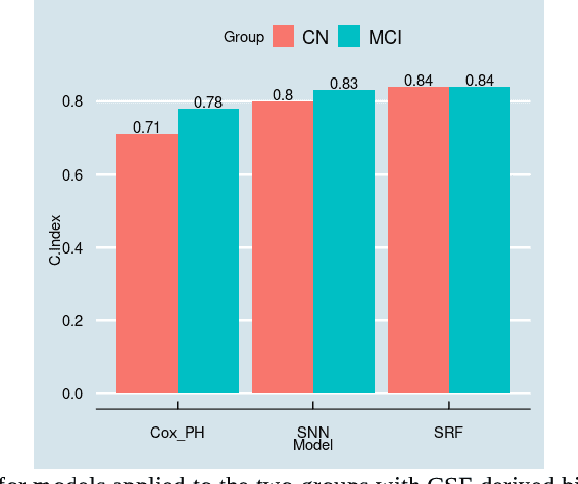Ida Pu
A Machine Learning Approach for Predicting Deterioration in Alzheimer's Disease
Jun 17, 2023Abstract:This paper explores deterioration in Alzheimers Disease using Machine Learning. Subjects were split into two datasets based on baseline diagnosis (Cognitively Normal, Mild Cognitive Impairment), with outcome of deterioration at final visit (a binomial essentially yes/no categorisation) using data from the Alzheimers Disease Neuroimaging Initiative (demographics, genetics, CSF, imaging, and neuropsychological testing etc). Six machine learning models, including gradient boosting, were built, and evaluated on these datasets using a nested crossvalidation procedure, with the best performing models being put through repeated nested cross-validation at 100 iterations. We were able to demonstrate good predictive ability using CART predicting which of those in the cognitively normal group deteriorated and received a worse diagnosis (AUC = 0.88). For the mild cognitive impairment group, we were able to achieve good predictive ability for deterioration with Elastic Net (AUC = 0.76).
Predicting Alzheimers Disease Diagnosis Risk over Time with Survival Machine Learning on the ADNI Cohort
Jun 17, 2023



Abstract:The rise of Alzheimers Disease worldwide has prompted a search for efficient tools which can be used to predict deterioration in cognitive decline leading to dementia. In this paper, we explore the potential of survival machine learning as such a tool for building models capable of predicting not only deterioration but also the likely time to deterioration. We demonstrate good predictive ability (0.86 C-Index), lending support to its use in clinical investigation and prediction of Alzheimers Disease risk.
 Add to Chrome
Add to Chrome Add to Firefox
Add to Firefox Add to Edge
Add to Edge